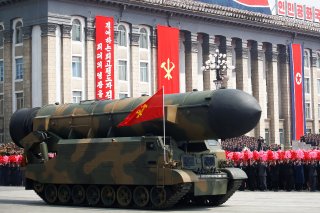Is South Korean Nuclear Proliferation Inevitable?
Seoul’s nuclearization is only a matter of when. The alliance should be ready to adopt this new idea before it is too late.
The United States needs to reconsider its general nuclear policy towards key allies from the view of security interests, not just from political and non-proliferation perspectives. The eastern bloc recognizes the influence of the United States in Northeast Asia, not to mention East Asian U.S. allies’ recognition of the strategic importance of the U.S. presence. Thus, there is no need for the White House to be wary of its regional influence diminishing after nuclearization; officials should rather closely discuss how to protect common security interests.
Seoul’s nuclearization overlaps with America’s strategic interests in managing North Korean risks and deterring China. The rise of South Korea as a forefront nuclear-armed power, possibly followed by Japan, would drive China to the corner, forcing Xi Jinping to act on Pyongyang’s nukes. It is China that would be afraid of this situation most. As long as Seoul’s atomic bombs are expected to meet the future needs of American Indo-Pacific strategy, the White House would propose or accept it.
A South Korean nuclear program can bring a change to regional dynamics. A close neighbor’s new nuclear arsenal will lead Pyongyang to believe that the United States is a lower security threat, making the U.S. mainland safer. It is also possible that the nuclear balance of terror might result in an inter-Korean moratorium and nuclear arms control talks to prevent the accidental use of nuclear weapons, as we observed during the Cold War.
Multipolarity limits a single state’s ability to respond to a coalition of a few nuclear-armed challengers against the established order. That is why support from friendly nuclear states in each region is necessary more than ever, just like the United Kingdom, Israel, and India respectively contribute to Washington’s regional influence. Northeast Asia still doesn’t have weapons yet, but it would be wise to pave the way for key allies to do the same for the common goal of deterring China and North Korea. This will also upgrade the bond of solidarity between key alliances.
Alliances are maintained by reciprocal interests. A nuclearized South Korea would serve Washington’s Indo-Pacific policy, countering both China and North Korea as a responsible linchpin ally and sharing the burden in East Asia.
It is time for Washington and Seoul to break away from the delusion that they can curb North Korea’s nuclear program or deter the rise of the Chinese military with allies’ conventional arms. The question that Charles de Gaulle raised about the United States’ willingness to risk New York for Paris is still alive and more valid in Northeast Asia than anywhere else. Seoul’s nuclearization is only a matter of when. The alliance should be ready to adopt this new idea before it is too late.
Daehan Lee is a political and security affairs researcher regularly writing for Defense News and Naval News. He previously worked for the U.S. and Belgian embassies in Seoul, the People Power Party, and election camps. Lee also served as a translator for the Republic of Korea Navy. His interests are Asia-Pacific security, (non)proliferation, defense acquisition, South Korean politics, and foreign policy. Follow him on Twitter @DaehanKorea and connect on LinkedIn.
Image: Reuters.

